Nate Fleming's Blog, page 19
June 15, 2016
Thimblerig’s Interview • Phil Vischer, Creator of Veggietales
 The Phil Vischer Podcast is one of the few podcasts I listen to consistently. I love the thoughtful conversations about important topics, the relaxed and comfortable atmosphere created by hosts Phil Vischer, Skye Jethani, and Christian Taylor, and the humor. There’s a lot of laughter each week, and considering all the difficulty and trouble in the world, a good dose of laughter is a welcome addition.
The Phil Vischer Podcast is one of the few podcasts I listen to consistently. I love the thoughtful conversations about important topics, the relaxed and comfortable atmosphere created by hosts Phil Vischer, Skye Jethani, and Christian Taylor, and the humor. There’s a lot of laughter each week, and considering all the difficulty and trouble in the world, a good dose of laughter is a welcome addition.
Phil is best known for creating Veggietales, as well as for voicing many of the characters on that long-running video series. He has an amazing story, and you can read about it in his fantastic book, Me, Myself, and Bob: A True Story About Dreams, God, and Talking Vegetables. I’ll also link a video from Biola University at the end of the interview, where you can watch Phil talk about the rise and fall of Big Idea Productions. It’s well worth your time.
I’m so grateful that Phil agreed to take a few minutes to answer some questions so that readers of this blog can get to know him better. I highly recommend that you give his podcast a listen, and also consider joining Phil and the gang in supporting their new Patreon page so Phil can do all sorts of new and fun things!
Phil, most people know your work, even if they might not know your name. Why don’t we start with a little bit about who you. Who are you and where do you come from?
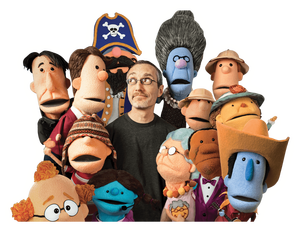 Hi, I’m Phil! I was born in Muscatine, IA, moved to the suburbs of Chicago when my parents split up while I was in junior high, and now live in the vicinity of Wheaton, IL with my wife and two youngest kids. I make stuff. Vegetables, puppets, Bible-teaching videos, podcasts and such. I used to think of myself as a filmmaker, but now I really think of myself as a communicator.
Hi, I’m Phil! I was born in Muscatine, IA, moved to the suburbs of Chicago when my parents split up while I was in junior high, and now live in the vicinity of Wheaton, IL with my wife and two youngest kids. I make stuff. Vegetables, puppets, Bible-teaching videos, podcasts and such. I used to think of myself as a filmmaker, but now I really think of myself as a communicator.
Can you tell us some of the folks who have influenced you the most creatively?
Walt Disney and Jim Henson, obviously. (Animation and puppets!) But also Monty Python and the films of Terry Gilliam, Wes Anderson, the Coen brothers and Tim Burton. I tend to favor witty Brits for some reason. (Terry Gilliam’s bizarre British children’s film Time Bandits was a huge influence on me.)
How about your spiritual or theological influences?
C.S. Lewis and G. K. Chesterton (I tend to favor witty Brits), as well as N.T. Wright, Dallas Willard, Henry Blackaby and A. W. Tozer.
What are your top three favorite films, and why?
That’s tough. Three films that I love … Gilliam’s Time Bandits, Anderson’s Moonrise Kingdom, the Coen brothers’ O Brother Where Art Thou and The Hudsucker Proxy.
Speaking of films, we talk about Christian films quite a bit on the Thimblerig’s Ark blog. What are your thoughts on the state of the faith-based film industry and where do you see it heading in the future?
We seem to be in the same position as the Christian music industry in the mid-1970s. Sales were growing and artists started to realize that Christian music was something you could actually do for a living. Like – for real. That brought a huge influx of new artists, expanding the industry greatly through the 1980s and into the 1990s. New record labels, better distribution, higher quality production, more talented artists. By the late 1990s, Christian music was so good that new artists realized they could sign with secular labels and pursue much broader audiences. They didn’t need the Christian cocoon to survive, and so Christian labels began to atrophy even as Christian artists made more impact on the world. This same dynamic could be happening now with Christian film, where suddenly it appears that Christian filmmaking is a viable business. Right now we’re building the Christian infrastructure (marketers, distributors, financiers). But ultimate success would be to discover we no longer need distinct Christian infrastructure – that Christian filmmakers are proficient enough that they can move seamlessly in the secular film industry. That’s a ways out still, but it’s a good goal.
You obviously know your way around family-friendly entertainment, but considering that the Bible is often not very family-friendly, can a Christian artist create content that is not family-friendly without compromising his or her faith? If so, how would you recommend they go about it?
 Sure – there’s a fair amount of non-family-friendly art created by faithful Christians. I’m thinking of horror films in particular. Scott Derrickson’s The Exorcism of Emily Rose and the two Conjuring films are two examples of Christian filmmakers succeeding in bringing their point-of-view to art that will never get shown in churches. The fact that horror films are the example shows something very important: There has to be an audience for the stories you want to tell. Scott Derrickson in particular made Emily Rose because it represented an intersection between stories of faith and stories that the world was interested in seeing. Exorcism. Horror films are easy to market. Just like Kendrick brothers films are easy to market. A non-family-friendly faith film in another genre might be much, much harder.
Sure – there’s a fair amount of non-family-friendly art created by faithful Christians. I’m thinking of horror films in particular. Scott Derrickson’s The Exorcism of Emily Rose and the two Conjuring films are two examples of Christian filmmakers succeeding in bringing their point-of-view to art that will never get shown in churches. The fact that horror films are the example shows something very important: There has to be an audience for the stories you want to tell. Scott Derrickson in particular made Emily Rose because it represented an intersection between stories of faith and stories that the world was interested in seeing. Exorcism. Horror films are easy to market. Just like Kendrick brothers films are easy to market. A non-family-friendly faith film in another genre might be much, much harder.
Turning to your podcast, “The Phil Vischer Podcast” has been one of my favorite podcasts for the past couple of years, although I’m still not a fan of the ukulele. What made you decide to start a podcast, and what have been your biggest challenges as you’ve sought to build your audience?
I can’t answer your question until you apologize to my ukulele. He’s crying in the corner right now. I was having these interesting conversations in my head (I’m an introvert), and sometimes at Q&A sessions with college kids after speaking. I thought I should share those conversations with more people. As for building an audience, we haven’t really done anything. As a result, our audience isn’t terribly huge! But it’s still fun.
Recently, you celebrated your 200th podcast episode. Congratulations! Having started my own podcast that lasted all of five episodes, I know that 200 episodes is quite the accomplishment. On that episode you talked about your new Patreon crowd funding account. Can you talk about what led you to creating the Patreon page, and what some of your plans for using the support you raise?
 I got to the point where the podcast probably needed to get more organized if it was going to continue – which meant I needed a little help. Which meant I needed to pay someone for that help. Which meant there needed to be a source of income. We’ve talked about sponsorship before, and may still do that, but Patreon was a better first step.
I got to the point where the podcast probably needed to get more organized if it was going to continue – which meant I needed a little help. Which meant I needed to pay someone for that help. Which meant there needed to be a source of income. We’ve talked about sponsorship before, and may still do that, but Patreon was a better first step.
Do you have any final advice for Christians looking to get involved in the entertainment industry – Christian or otherwise?
Just do it. Make stuff. It’s really easy to make stuff, develop a sensibility and a voice. Use YouTube and Vimeo and iTunes to get your work out there. The key is to begin making stuff for zero or near zero budget to see if your sensibility can attract an audience. If the first thing you want to make is a $40 million feature, forget about it.
What are the best ways people can follow you (Twitter, Facebook, etc)?
Yes and yes! Go to philvischer.com. Sign up for my emails. I’ll then follow YOU all around with email!
Twitter:@philvischer
Facebook: /PhilVischer
Thank you for taking the time to answer my questions, Phil!
You’re welcome! Keep on rigging your thimble!
That we will, Phil. That we will.


June 9, 2016
The God’s Not Dead $100M Lawsuit
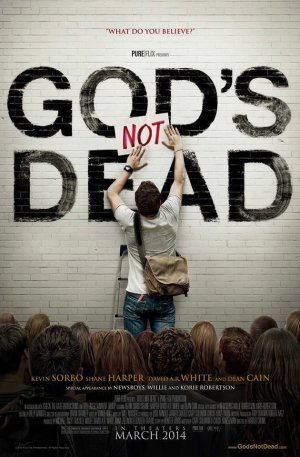 According to the Hollywood Reporter, David A.R. White and Pure Flix are being sued for God’s Not Dead. For $100,000,000.
According to the Hollywood Reporter, David A.R. White and Pure Flix are being sued for God’s Not Dead. For $100,000,000.
That’s one hundred MILLION dollars.
And no, they are not being sued by a horde of angry atheist philosophy professors. Rather, they are being sued by a duo of fellow Christian filmmakers.
Again.
The new lawsuit is brought to you by director and producer Michael Landon, Jr (the son of Little House on the Prairie‘s Michael Landon – not relevant, but interesting) and writer Kelly Kullberg, wherein they allege that Pure Flix used Kullberg’s story ideas without proper credit or remuneration in God’s Not Dead.
The suit can be seen here in its entirety if you enjoy reading legal documents. If you don’t, I’ll summarize.
According to the suit, Kullberg and Landon wrote the script for a film called Rise, based on the story of a fictional Christian university student being harassed by an atheist philosophy professor. At some point while the script was being developed, Kullberg pitched the idea in detail to a potential investor, that person went on to share details of the story with Ted Baehr from Movieguide®, and Baehr shared those details with David A.R. White while they were on some kind of a “working vacation.”
The suit alleges that White and others in Pure Flix had been struggling to break story for Proof, an apologetics film they’d been developing, and this was the subject of his and Baehr’s discussion on said vacation. Further, the suit alleges that Baehr went on to tell White elements of Kullberg’s story that had been told to him by this potential investor, perhaps unaware that these elements were the intellectual property of Landon and Kullberg.
The next thing you know, Pure Flix drops Proof and not long after makes God’s Not Dead. That movie, as we all know, went on to make buckets of money (the suit says $140,000,000, but the internet says it is closer to $100,000,000). Either way, the overwhelming success of God’s Not Dead enabled Pure Flix to expand their operations exponentially; they developed a distribution wing that allowed their films to open wider than ever before, they became more involved in film production, they expanded their presence in the overseas market, and perhaps most significantly, they started a Netflix-esque home streaming service to attempt to meet the needs of the enormous faith-and-family-film demographic.
Interestingly, a similar lawsuit was brought against Pure Flix last year for $10 million. In that suit, producer John Sullivan and writer/actor Brad Stine alleged that they had also developed a script that closely followed the God’s Not Dead story line, the aforementioned Proof. But in their case, they had actually been working closely with White and Pure Flix to develop the script before they’d been dropped like a soggy eggroll.
[editor’s note: the suit doesn’t actually say anything about a soggy eggroll.]
Kullberg alleges that White was so inspired by the ideas behind Rise that he pulled out of Sullivan and Stine’s script, hired new screenwriters to write God’s Not Dead, and the rest is history.
On the one hand, it’s interesting that in both cases, White allegedly heard details from both story ideas, and details from both versions wound up in the finished product of God’s Not Dead. In Landon and Kullberg’s case, the similarities are pretty staggering, and it makes quite a compelling argument that it could very well be a case of copyright infringement.
On the other hand, people come up with similar ideas all the time, especially in Hollywood. Just look at these somewhat recent examples: Jobs and Steve Jobs; Unfriended and Friend Request; Olympus Has Fallen and White House Down. In the case of the atheist professor and the Christian student, both Landon & Kullberg and Sullivan & Stine developed the same basic idea independently. Not to mention that that variations of that story have been floating around for years.
So, what do we do with this? Is it typical Hollywood shuck and jive, just with a somewhat “sacred” bent? Is it another example of how absolute financial success corrupts absolutely? Is it more proof that Christians in business are just as susceptible to temptation and greed as anyone in business?
Is it another example why a Christian film industry is a bad idea?
Maybe. Maybe not. But it is a situation worth looking at as a cautionary tale (regardless who might be right, and who might be wrong), especially for Christians who are looking at getting involved in business or the arts, or just about anything where windfall profits are a possibility.
Meanwhile, those of us on the outside will sit back and watch how it plays out. Personally, I’m rooting for this to be resolved amicably, and then for Pure Flix to do the very meta move of developing this as the plot for God’s Not Dead 3.
Written by all six screenwriters, of course.
—
By the way, click this link to find some more details about the development of Sullivan and Stine’s screenplay by screenwriter Sean Paul Murphy, who was working with White and Pure Flix to help develop the script along with his writing parter, Tim


May 22, 2016
The Act One Writing Program… Is It Worth It?

I’ve had several people contact me and ask me to share my experiences with the Act One program. Rather than just cutting and pasting my response to this question into different emails, I thought I would just post it here to answer the question once and for all:
Is Act One worth it?
Before I get to that question, let’s start with a little teaser about Act One, in case you aren’t familiar with the organization.
As longtime readers of this blog know, I have lived overseas for the past fifteen years. I chose to attend the Act One Writing Program back in 2007 while living in Kazakhstan and working with the Kazakhstan English Language Theater (KELT). I had dreams of expanding KELT to include filmmaking, and so I chose to take part in the writing program while home for the summer.
Unfortunately, when I returned to Kazakhstan after taking the program, life stepped in the way, as it is want to do, and I had to put the film plans on hold. I continued writing and theater production, but was forced to watch my filmmaking dream wither on the vine.
Now I live in China, where filmmaking is growing in leaps and bounds, and I have long-term plans to resurrect that dream. I’m developing a few live action film ideas, and I’m also adapting my novel, Thimblerig’s Ark, into an animated feature screenplay.
But this leads us back to the question: was Act One worth it? As a person whose route to the film industry has been anything but direct, would I recommend that hopeful Christian artists spend the money and a month in L.A. working with professional film industry people, studying the process of writing or film production with Act One?
The short answer is yes, to both questions.
My Act One experience was transformational for me as as a writer, and my short time there also had a profound impact on my life as a Christian. That month in L.A. helped me see how artistic endeavors could be more than ego aggrandizement, and the huge potential for created art to bring glory to the One who created Art.
Any believer who is considering entering into the film industry (or even believers who just want to develop their own artistic sensibilities when it comes to film) can find great benefit from investing in the Act One program.
Just as I did.
The three reasons why I feel this way:
1) The Friendships and Relationships Developed
My involvement in Act One has led to some great relationships with people who are in Hollywood, working in the film industry. Getting to know them, I have developed the utmost respect for people living their faith in the trenches, and I see them as missionaries as much as anyone I’ve met while living and working overseas. My Act One friends helped me edit my first novel, dialogue with me frequently about my thoughts on Chrisitan filmmaking here on the blog, and even taught the excellent screenwriting class I took at Asbury last year (, writer of Mom’s Night Out and other films).
Without Act One, I would have been hard pressed to know any of these people.
2) The Power and Value of Story
Act One champions the power and value of story, and this is something that Christian filmmakers need to learn. While you could probably get much of what was taught in class from a book, there was the added and very real benefit of sitting in a classroom with twenty other passionate students, all working through the same issues, listening to stories by film industry professionals. I felt, for that month, that I had found my people – people who loved movies, loved talking about them, analyzing them, dreaming about making them. And we went on a month-long journey together.
As a class, we spent time looking at examples of strong cinema storytelling and having discussions about why those examples were strong. We learned how to develop and pitch our story ideas, including holding a pitch session with actual producers. We heard stories from successful screenwriters and producers, where they told about the challenges, difficulties, and rewards of pursuing this particular line of work. Act One brings in top of the line talent to teach and get to know students; faculty with years and years of collective experience, and we soaked up every day.
My only regret was that the month was too short.
3) The Diverse Christian Perspective
As much as I loved developing the relationships, as much as I soaked up learning about the power of story, the best thing about Act One was that everything was done from a Christian perspective. Believers from all different backgrounds took part both as students and as teachers, and I felt right at home in that atmosphere. It reminded me of my experience living overseas, where the differences of our denominations and traditions weren’t as important as our being faithful Christians in difficult or stressful situations.
I was also relieved that Act One wasn’t trying to train us to go out and build a Christian film industry (although the program certainly equipped us to be a part of faith-based filmmaking), rather they were training us how to survive and thrive as Christians in the secular film industry.
That being said, my relationships in Act One also introduced me to several weekly Bible studies and prayer groups in the Los Angeles area, helped me get to know many of the great churches that are hard at work ministering in those parts, and led me to learn about many of the other fantastic Christian organizations ministering in Hollywood, such as Hollywood Prayer Network and 168 Film, to name just a couple.
So, is Act One worth it? Even if you don’t wind up living in a 900- zip code? Well, I couldn’t be farther away from the biz, but since 2007, but I’ve used what I learned at Act One over and over.
I used it in developing Thimblerig’s Ark as well as other projects both published and not.
I used it while working with the theater in Kazakhstan.
In my writing classes here in China, I use it quite often, taking students through intense novel and short story writing.
I use it when analyzing films with a critical mind.
Along those lines, I use it all the time when putting my thoughts together for writing about the Christian Film Industry for this blog, with much of what I wrote in What’s Wrong With Christian Filmmaking coming directly from what I learned in Act One.
And so, yes, Act One is absolutely worth it. It’s worth the money you pay, it’s worth the time you spend away from your family, it’s worth the mental energy you will bring to the table. And if you have the desire to be a part of the film industry and to do it in a way that is true to your faith as a Christian, it is most definitely worth it.
I just wish I could do it again!
—
To apply for the Act One Writing Program, click here. And while I didn’t take the Producing & Entertainment Executive Program, I’ve heard good things about it as well. Click here for more information.
NOTE: The deadline for applying for the 2016 summer program is May 25, 2016, so don’t delay!
—
And by the way, nobody from Act One asked me to write this. I just really believe in the program.


May 20, 2016
Twitter Responds To Clinton’s Venn Diagram Fail
I don’t usually post political items, but this is just too amusing, and so I can’t help myself. A few hours ago, Hillary Clinton’s twitter page posted this.
Dear Congress,
Let's get this done.
Thanks,
The vast majority of Americans pic.twitter.com/23ND36tFFm
— Hillary Clinton (@HillaryClinton) May 20, 2016
Now, in case you are wondering exactly what that tweet means, you wouldn’t be the only one. It seems that Mrs. Clinton is trying to use a Venn Diagram to promote the idea of Congress doing something about universal background checks, and somehow it has something to do with 90% of Americans, and 83% of gun owners. But, something went wrong with the execution.
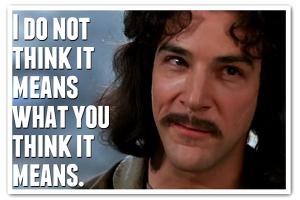
This is one of those golden moments that Twitter could not allow to pass unnoticed. And I don’t care if you are for Hillary, for Trump, for Bernie, or for Flavius Octavius von Imasillyman, you have to appreciate the humor of it all.
Here are some of the responses offered by the Twitterverse:
@HillaryClinton pic.twitter.com/e1MWUxOQwW
— Travis (@travislylesnews) May 20, 2016
And then there’s this…
.@HillaryClinton pic.twitter.com/y8lBRoAW6l
— Shoshana Weissmann (@senatorshoshana) May 20, 2016
And this…
. @HillaryClinton splendid chart pic.twitter.com/fIoC64fNLg
— ArthurB (@ArthurB) May 20, 2016
See, Twitter wants to make sure that the Clinton campaign understands that the point of a Venn Diagram is to help you to understand something better, not make it even more confusing. And so, there was plenty of help proffered.
For example:
.@hillaryclinton pic.twitter.com/daWooyCzOQ
— Michael Deppisch (@deppisch) May 20, 2016
And this…
@HillaryClinton pic.twitter.com/kKO17xvFzZ
— Travis (@travton) May 20, 2016
And this…
@JackByrom @_JohnMichael @HillaryClinton pic.twitter.com/uSvVIsUI0A
— Nathan Miller (@DJSnaKK) May 20, 2016
And because the power of the Venn Diagram had now been shown to the Twitterverse, others started trying to use it to their own benefit. Like this Seinfeld fan page:
Dear congress,
While ur taking requests plese also get this done
Thank u,
Like 100% of america pic.twitter.com/9iEAnIgrL9
— Seinfeld Current Day (@Seinfeld2000) May 20, 2016
And this guy, who was looking for the Venn Diagram to help provide some answers for his struggling marriage:
Hi @HillaryClinton can you help me? Here is a venn diagram of my predicament pic.twitter.com/qdoKxMPlu2
— temporary blues fan (@HellblazerVice) May 20, 2016
And this person who wanted to show that a Venn Diagram can even help you understand other countries!
@senatorshoshana @HillaryClinton pic.twitter.com/SmgmExXLMW
— Luke Thompson (@ltthompso) May 20, 2016
So, thank you Twitter, for helping end the week on a high note. And whoever it was in Mrs. Clinton’s campaign that made this error, don’t worry. Truth be told, the internet’s got your back.


May 16, 2016
Thimblerig’s Three Interesting Things of the Day • May 17, 2016
It’s been a slow few weeks, and considering I have a personal boycott of anything having to do with the presidential election and I’m tired of people arguing about bathrooms, I thought I would reinstate the old “Three Interesting Things” I’ve found recently as I’ve been jumping around the internet.
Today, I’ll be writing about Lecrae, Phil Vischer, and The Flash.
1. Lecrae Signs a Deal with Columbia Records
 This is tremendously exciting news for a number of reasons. But for me, I’m excited because it shows that secular companies recognize and reward artistic excellence, even when it comes from *gasp* Christians.
This is tremendously exciting news for a number of reasons. But for me, I’m excited because it shows that secular companies recognize and reward artistic excellence, even when it comes from *gasp* Christians.
This news also flies in the face of the American persecution narrative that is so popular in certain Evangelical circles these days. If things were so bad for American Christians, would one of our top artists be getting deals with major labels?
Let’s take a moment and look at this particular artist.
Over the past few years, Lecrae has had songs reach #1 on the Billboard charts, won two Grammy awards, and has appeared on secular national television performing his music (see the video above). These things wouldn’t have happened if he cared about his artistic integrity less than he did sharing his faith, and I think his story should inspire all Christian artists to work hard on achieving excellence in both things.
Believing artists, take your craft seriously, do it with all excellence, and the world will notice and respond.
2. Phil Vischer’s Patreon Page
You might know Phil Vischer as the creator of Veggietales. Well, I have been a loyal listener of the Phil Vischer podcast for the past couple of years, which I wrote about in a past article. I highly recommend this podcast for those of you who want fun and reasoned discourse on all sorts of important issues. Phil and his co-hosts Skye Jethani and Christian Taylor do a great job breaking down stories of the day and discussing them from a Christian perspective.
Recently, Phil announced that he was starting a Patreon account so that the podcast gang can branch out and do more. I’m personally excited to see what this might mean, and am happy to encourage Thimblerig readers to consider supporting Phil’s Patreon as well.
So, if you aren’t familiar with Phil and his podcast, go check it out!
3. The Runaway Dinosaur
 Okay, technically, this isn’t a news story I found online. It’s an episode of my family’s favorite television program, The Flash. And if you don’t watch The Flash, know that it delivers, week after week.
Okay, technically, this isn’t a news story I found online. It’s an episode of my family’s favorite television program, The Flash. And if you don’t watch The Flash, know that it delivers, week after week.
My family loves it, my toddler thinks that he is the Flash (see the video below), and I’ve been consistently impressed by the way the show delivers action with heart. Grant Gustin is the perfect Barry Allen/Flash, and in this past week’s episode (directed by Kevin Smith), the show outdid itself, taking us to places we’ve never been before. And darned if I didn’t get a bit teary-eyed by the way they wrapped up Barry’s time with the Speed Force. Great job to Gustin and the cast, , writer and producer .
If you aren’t watching The Flash, then what are you waiting for? Binge the past two seasons and get caught up in time for the summer hiatus.

Photo by Christopher Patey
Having said that, I do have one word of criticism for The Flash and the other superhero programs produced by Greg Berlanti, and I’ll mention it in the off-and-not-likely-chance that he reads this article.
Mr. Berlanti, I appreciate that you are committed to diversity with the programs you produce, attempting to represent all different aspects of our society. For example, I thought it was bold and brave that you made the potentially controversial choice to have the West family be African-American rather than Caucasian, that you’ve consistently had strong female characters as well as male, and that you have quietly introduced homosexual characters, all in an attempt to reflect society.
But, in my opinion, you’ve left out one group of people, and it’s pretty glaring.
Where are people of faith?
Almost 90% of Americans identify as religious, and yet we see no people of faith (not counting ancient Egyptian religion) in any of your superhero programs. No character turns to their religious beliefs to help them grapple with receiving super-powers, no character mourns the loss of another character by praying in (or out of) church, no character reads any sort of sacred text as inspiration or goes to a priest to discuss what is happening in the world, no talking heads discuss the theological ramifications of super beings in the background on Central City talk shows.
It’s a pity, especially when a nuanced handling of the topic could increase the potential power of The Flash, Arrow, Supergirl, and Legends of Tomorrow, putting them over the top of being great dramatic/action television.
So, Mr. Berlanti, as a “fan of faith”, I’d love it if you’d consider representing my people in your programs as well.
—
By the way, here’s my toddler (Noah, the fastest three year old alive) recreating a Flash sprint through the ferry terminal here in Shenzhen, China, complete with the slow motion scenes. And yes, we are planning on getting him a Flash costume when we are back in the U.S. this summer.
Thanks for joining us for Thimblerig’s Three Interesting Things of the Day! Look for a new episode next week, and feel free to share your own interesting stories!


May 9, 2016
An End Times Movie in Two Minutes
We Christians just love our end times movies.
We’ve done bunches and bunches of them, from the classic A Thief in the Night trilogy to Kirk Cameron’s Left Behind movies to Nic Cage’s Left Behind movie reboot to movies with subtle names like Final: The Rapture and Tribulation and Revelation Road (1, 2 & 3) and The Apocalypse and The Remaining and Blink of an Eye and Pre-Trib! The Musical…
That last one might not be real.
But, if you look at the bulk of Christian-made movies out there, and how many seem to deal with this topic, then you would have to conclude that we Christians must just love our end times movies.
But maybe you’ve never seen one of our end times movies, want to know what the big deal is, but don’t actually want to sit through 90 minutes of a Christian film? Well, Thimblerig comes to the rescue! If you watch this two minute clip from Community’s third season, you’ll get a pretty good idea of what our end-of-days movies are all about. In fact, Dan Harmon pretty well nails it.
Although I must admit that the Community clip does have a bit more nuance, subtlety, and artistry then our usual attempts at showing the end-of-days, but I think you get the picture.
Meanwhile, if you want to see some of my reviews of a couple of end times movies…
Here’s Left Behind, which was awful.
And here’s The Remaining, which was actually pretty good.


Young Writer Chronicles: Students Around the World Discover a Love for Writing
I was pleased and honored to be asked to write an article for the National Novel Writing Month about my experiences as an international educator taking students through NaNoWriMo. Here is an excerpt from that article, with the link to the whole article at the bottom of the page.
Young Writer Chronicles: Students Around the World Discover a Love for Writing
by Nate Fleming
 I fell into NaNoWriMo backwards, through Script Frenzy, a program sponsored by the nonprofit behind NaNo from 2007 to 2012. In Script Frenzy, a writer would write the first draft of a screenplay over the month of April. At that time, I had aspirations to be a screenwriter, even going so far as to take a screenwriting course in Hollywood over the summer of 2007 to help me down this path.
I fell into NaNoWriMo backwards, through Script Frenzy, a program sponsored by the nonprofit behind NaNo from 2007 to 2012. In Script Frenzy, a writer would write the first draft of a screenplay over the month of April. At that time, I had aspirations to be a screenwriter, even going so far as to take a screenwriting course in Hollywood over the summer of 2007 to help me down this path.
My biggest obstacle to a screenwriting career was geography. That summer I’d come to Hollywood from my wife’s home country of Kazakhstan, where I was teaching in an international school. Central Asia is not exactly the best place for a writer to live if he wants to break into Hollywood, is it? So, on the advice of a screenwriter friend, I turned to NaNoWriMo. If I couldn’t be in Hollywood to sell my screenplay idea, perhaps I could write a novel, and that novel could sell itself! In 2008, I decided to set aside November to work on making my screenplay into a novel.
 Although I didn’t finish the novel that year, I enjoyed NaNoWriMo so much that in 2009, I decided to try and see if I could fit NaNoWriMo’s Young Writer’s Program into my international school’s curriculum. That year, with the approval of my administration, I piloted taking a valiant class of fifth graders through the month of writing, and it was maddening, exhilarating, insane, and immensely rewarding.
Although I didn’t finish the novel that year, I enjoyed NaNoWriMo so much that in 2009, I decided to try and see if I could fit NaNoWriMo’s Young Writer’s Program into my international school’s curriculum. That year, with the approval of my administration, I piloted taking a valiant class of fifth graders through the month of writing, and it was maddening, exhilarating, insane, and immensely rewarding.
My eyes were opened as I saw students who had previously struggled to write a paragraph effortlessly filling pages and pages of a first draft. It also unlocked writing in other classes across the curriculum, and writing was coming easier for these students in history, science, and literature classes. It was revolutionary! The doors had been opened, and my students suddenly believed that they could write! It was almost magical!
To read the rest of the story, go here.


May 3, 2016
Happy Star Wars Day from Thimblerig!
May 1, 2016
Thimblerig’s Spoilerific Thoughts on Captain America: Civil War

One of the benefits of living in China is that every now and then, the Hollywood studios decide to roll out their big films in our corner of the world, rather than in the United States, where you’d think they’d drop first. Of course, there’s quite a bit of irony in the fact that a Captain America movie would not premiere in America, but regardless, it’s still cool for us. And considering the movie has already made $84 million internationally [update: $200.2 mill], and has yet to open in the United States or even in my host country of China, I’d say it’s been cool for a whole lot of people.
So, yesterday my kids and I hopped a ferry from Shenzhen to Hong Kong with the express purpose of eating at McDonald’s Next, and taking in a viewing of Captain America: Civil War. It was a tiring day, but was it worth it?
 Absolutely, it was.
Absolutely, it was.
As director Scott Derrickson (Doctor Strange) tweeted yesterday:
Captain America: one of the few truly great movie trilogies.
— Scott Derrickson (@scottderrickson) April 30, 2016
I agree wholeheartedly with Derrickson. This is a trilogy where nothing erodes or gets lost from episode to episode. In fact, if anything, each installment builds on and improves on the other. Even my beloved original Star Wars trilogy wasn’t able to accomplish this, with The Empire Strikes Back unarguably the high point of the trilogy.
With Captain America, the films just get better and better, and this last installment is – by far – the high point.
Before I get into my thoughts on the film, I want to discuss the biggest, most glaring lesson that I took from the film. And no, this doesn’t involve spoilers.
The Goodness of Steve Rogers
 Ever since Chris Evans and the Russo brothers first suited up, I have been constantly blown away by the unflinchingly goodness of Captain America. This is a character that lives for doing the right thing, even when the forces of the world are arrayed against him. As we saw in Avengers: Age of Ultron, he has a strong moral code, and he tries to elevate his comrades to live by that same code, even as they make fun of him. He would sacrifice everything for the sake of his friends, including friendship when need be. He has such a noble character that he could almost pick up Thor’s hammer, and if he had, we wouldn’t have been surprised.
Ever since Chris Evans and the Russo brothers first suited up, I have been constantly blown away by the unflinchingly goodness of Captain America. This is a character that lives for doing the right thing, even when the forces of the world are arrayed against him. As we saw in Avengers: Age of Ultron, he has a strong moral code, and he tries to elevate his comrades to live by that same code, even as they make fun of him. He would sacrifice everything for the sake of his friends, including friendship when need be. He has such a noble character that he could almost pick up Thor’s hammer, and if he had, we wouldn’t have been surprised.
And while most of the other superheroes we see are tortured about one thing or another, in the Captain America trilogy, Rogers is only tortured by two things: not being able to help is friends in need, and the fact that he is a man out of time, that he was ripped away from all that he knew when he was thawed out in the 21st century.
And yet, Captain America is one of the most popular superheroes to come out of modern superhero films.
 You could argue that one reason that Cap is so popular lies in the fact that Chris Evans is, as my friend Jasmine said, just so hot. (Yeah, I put that image there just for you, Jasmine. You’re welcome.)
You could argue that one reason that Cap is so popular lies in the fact that Chris Evans is, as my friend Jasmine said, just so hot. (Yeah, I put that image there just for you, Jasmine. You’re welcome.)
And while that might be the draw for a certain demographic, I don’t think Evans’ hotness has anything to do with the fact that I see kids here in China running around wearing red, white, and blue Captain America t-shirts.
Then what is it? In my mind, it boils down to the truth that Cap is the hero we all wish we had in our lives: someone who will stand up for us, and who will refuse to stay down on our behalf, because it will always be the right thing to do. But not only that, thanks to the Dr. Stark’s Super Soldier Serum, he has the skills to back up the stands that he takes. He’s like the Boy Scout’s Boy Scout, All-American, apple pie, Brooklyn, and all that jazz. Cap proves time and again that in the right hands, our absolutely good characters can be portrayed as absolutely good, and it can work. They don’t always have to go through a dark night of the soul to get there. (Hear that, Zach Snyder?)
This all speaks volumes about the Russo brothers and Joss Whedon, writers Christopher Markus and Stephen McFeely, and Chris Evans. They chose to handle this potentially irritating and absurdly good character with integrity and consistency. Directing, writing and acting tortured characters is not such a challenge. Directing, writing, and acting good characters that maintain their goodness throughout, and doing so in a compelling way is nearly impossible.
But these guys have pulled off the nearly impossible.
But enough Captain America pontification. If you have not seen Captain America: Civil War yet, and you are trying to steer clear of spoilers, then steer way clear of this blog post. Because here there be spoilers.
***SPOILERS SPOILERS SPOILERS***
I’m not going to take the time to summarize the events of the movie, as you can find that just about anywhere, including Wikipedia. Rather, I just want to give my thoughts.
• As anyone would know from watching the trailers, Captain America: Civil War could actually be called Avengers: Civil War. While it focuses most of the attention on Steve Rogers and Tony Stark, the filmmakers would have been hard-pressed to stuff any more Avengers into this film. And the amazing thing is that each Avenger has their moment to shine, and so the film doesn’t come close to feeling overstuffed.
 • I loved how both Captain America and Tony Stark are right, in their own way. It’s an interesting metaphor of how wars can really start – with a small disagreement that eventually billows out of control. And in wars, people get hurt. Civil War is no exception. And the fight at the end between the two of them feels earned, as compared to that other big superhero v. superhero film that came out earlier in the year. And I loved that the big issue between them isn’t resolved in the end. It gives us somewhere to go with the characters in the upcoming Infinity War films.
• I loved how both Captain America and Tony Stark are right, in their own way. It’s an interesting metaphor of how wars can really start – with a small disagreement that eventually billows out of control. And in wars, people get hurt. Civil War is no exception. And the fight at the end between the two of them feels earned, as compared to that other big superhero v. superhero film that came out earlier in the year. And I loved that the big issue between them isn’t resolved in the end. It gives us somewhere to go with the characters in the upcoming Infinity War films.
• I’m fascinated that Captain America, who has headlined three movies and been featured prominently in two others, is a character with no arc. Like James Bond or Indiana Jones, Cap changes very little, but rather demands change from those around him. Conversely, Tony Stark has been forced to go through several radical changes since he premiered in the original Iron Man, but with Captain America, this lack of substantial change works.
• The film’s humor is spot on. Considering the destruction of both property and relationships, the film has several laugh out loud moments. The strained relationship between the Falcon and Bucky being a great example, another being the expected quips of Spider-Man (more on him later). But the best example of use of humor in this film was anything that came out of the mouth of Scott Lang, aka Ant Man. If this film accomplished anything, it made me look forward to the next Ant Man film to see more of Lang, who played a decidedly BIG role in one of the best scenes of this, and just about any superhero movie that has come down the pike.
Oh, and while Stan Lee’s cameo was not so impressive, Rhodes’ (War Machine) response to it was priceless and perfect.

• Spider-Man. What can I say? Spidey has always been my favorite superhero, and while I enjoyed Tobey and Andrew’s turns in the red and blue suit, Tom Holland looks to be the perfect choice to carry the mantle. I love that he is actually the age that Spider-Man would be after just receiving his powers, and his immaturity shows. He is skilled, but not as skilled as he will be. And he is immature, just wanting to please Tony Stark, and so starstruck by his new relationship with him that he is unable to think for himself or entertain the notion that Stark might be wrong.
This film (and the end credits scene) are a nice setup to the new Spider-Man franchise, and I look forward to seeing what the filmmakers do with it (especially since we blessedly won’t have to sit through another tired Spider-Man origin story).
My one beef with Spidey in this film was that the CGI wasn’t quite as fluid as I would hope. There were moments that he looked cartoonish, which I hope that they fix when they make the standalone film.
• The trailer bait and switch. As with the trailer for The Force Awakens, the Russos did a great job making a trailer that made you think you knew what would happen, while in actuality, something else entirely was going to happen. Some examples: the almost Luke Skywalkerian Spider-Man trailers made it seem like Spider-Man would play a much smaller role in this film than he actually ended up playing. Also, the trailer made it appear that Bucky shoots down War Machine, when someone else altogether is responsible for that incident. I love when trailers do this, rather than just giving away everything, or not giving enough.
I obviously loved this film, but as I rode the ferry home writing notes, I realized that I had several questions:
How did Zemo know that blowing up Vienna would help him to achieve his actual goal of tearing apart the Avengers? I know that he had studied the Avengers, and he apparently knew that Cap would go off to help Bucky after he framed him for the destruction, but how did he know that Iron Man wouldn’t support his teammate?
Also, Zemo kept referring to December 16, 1991, the night that Stark’s parents were killed. How did he know that the Winter Soldier had something to do with it? Why did he even suspect it?
How did Cap know that the Winter Soldier killed Stark’s parents, and when did he find it out? I didn’t take any bathroom breaks, but I don’t remember this being explained.
Where did the Black Panther get his powers? I know the comic books explain this, but I felt like the film just wanted you to accept that he had them. That wasn’t quite good enough for me.
How did Stark know that Spider-Man was Peter Parker?
These are minor issues, and perhaps some intrepid reader can help explain the answers to me.
So, in conclusion, this film just continues to build on the fantastic MCU that is being developed with such incredible deftness and consistent balls-out-of-the-park by Marvel. It makes me that much more interested and even excited to see what Scott Derrickson and Benedict Cumberbatch do with Dr. Strange, where Guardians 2 takes us, and what will happen with Thor and Hulk in Thor 3. Not to mention Avengers: Infinity Wars.
Let me know your thoughts!


April 26, 2016
Thimblerig’s Review • Risen
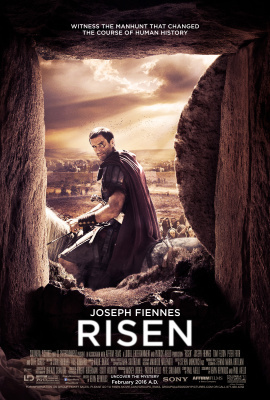 We’ve been living in an unusual time of cinematic history, where it has become normal to find a film or two aimed squarely at the Christian filmgoing audience in the local cinema at any given moment, often making decent box office. While the presence of so-called “Christian” films has become so much of a given that they are now even mocked by the entertainment industry, what has not been a given is the quality of the films. They typically resonate with the intended audience, but don’t typically make much of an impact outside of that demographic. And they’re usually destroyed by most critics, both secular and Christian, in the process.
We’ve been living in an unusual time of cinematic history, where it has become normal to find a film or two aimed squarely at the Christian filmgoing audience in the local cinema at any given moment, often making decent box office. While the presence of so-called “Christian” films has become so much of a given that they are now even mocked by the entertainment industry, what has not been a given is the quality of the films. They typically resonate with the intended audience, but don’t typically make much of an impact outside of that demographic. And they’re usually destroyed by most critics, both secular and Christian, in the process.
Why is this? Well, the reasons have been discussed far and wide (including right here on this blog), and hopefully filmmakers and film producers are starting to listen. Perhaps they are starting to heed the call to look beyond the bubble when casting the vision for their films. Maybe the time is coming that films produced for us will stop naval gazing, that filmmakers will put the kibash on creating works of propaganda rather than works of art. We can only hope that producers will begin to see the value in (to paraphrase the late Prince) giving the audience what they need, rather than what they want.
With the exception of a few slight missteps, Risen has the potential to do all of those things. Risen is a bubble burster (is that a word?), where the filmmakers have made a Jesus movie that isn’t focused on Jesus, and in the process, they’ve made a film that is potentially accessible to a large and varied audience.
 In the film, Clavius (Joseph Fiennes) is a Roman military tribune stationed in Jerusalem who is entrusted by Pontious Pilate (Peter Firth) with the responsibility of overseeing the execution of one Yeshua of Nazareth (Cliff Curtis). When Sunday comes, and the body has vanished from the tomb, Pilate orders Clavius to find the body and squash any trouble before the Emperor arrives to evaluate Pilate’s job as the prefect of Judaea. With the hourglass sand running, Clavius sets out to prove that Yeshua is dead.
In the film, Clavius (Joseph Fiennes) is a Roman military tribune stationed in Jerusalem who is entrusted by Pontious Pilate (Peter Firth) with the responsibility of overseeing the execution of one Yeshua of Nazareth (Cliff Curtis). When Sunday comes, and the body has vanished from the tomb, Pilate orders Clavius to find the body and squash any trouble before the Emperor arrives to evaluate Pilate’s job as the prefect of Judaea. With the hourglass sand running, Clavius sets out to prove that Yeshua is dead.
The goal of Thimblerig’s Film Reviews is to see how well movies made by Christians (or with Christian involvement) accomplish the five challenges I set out in my article, What’s Wrong With Christian Filmmaking. Those challenges are:
1. Take more risks
2. Challenge your audience
3. Provoke your audience by raising questions without necessarily giving the answers
4. Recognize that art is art and the pulpit is the pulpit
5. Tell good stories
The reviews are honest about what the filmmaker has done well, and where improvement is needed. I humbly acknowledge that making any film is a huge achievement, worthy of respect, and I hope my reviews are read with that in mind.
So, now to Risen, with a slight spoiler warning.
1. Did Risen take risks?
Let me put it this way: I’m amazed that Risen got made.
First, when you consider the thrashing the “faith-based” audiences gave to Aronovsky’s Noah and Scott’s Exodus, one would think that no studio would have the nerve to play around with the biblical narrative again. But here’s a movie that took that narrative and flipped it on its head, examining the story of Christ from an entirely different perspective. And best of all, the filmmakers managed to do it in a way that didn’t make the audience feel disrespected.
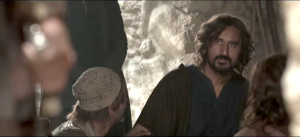 Second, as I said earlier, it was a risk to make a Jesus movie and barely show Jesus, and not even say the name “Jesus,” rather opting for the Hebrew name, Yeshua. I also admire that the filmmakers went the route of casting a non-white actor in that role, acknowledging that Jesus may actually have not been blond and blue-eyed. This is something that Hollywood doesn’t even have the nerve to attempt.
Second, as I said earlier, it was a risk to make a Jesus movie and barely show Jesus, and not even say the name “Jesus,” rather opting for the Hebrew name, Yeshua. I also admire that the filmmakers went the route of casting a non-white actor in that role, acknowledging that Jesus may actually have not been blond and blue-eyed. This is something that Hollywood doesn’t even have the nerve to attempt.
Third, the filmmakers also took a bit of heat for portraying Mary Magdelene as a prostitute, something that is not supported by the biblical text, but was a risky choice that was good for the film. It made Mary Magdelene’s journey that much more powerful, seeing that she went from being “known” by the majority of the soldiers in the barracks to knowing and following Yeshua, to the point of being willing to die for him.
[As an aside, did anyone else notice what Clavius’s assistant called Mary Magdelene when Clavius said she was mad? “Perhaps she’s a witch, sir. Shall I have her stoned?” I really want to know if the filmmakers gave Tom Felton this line because he played Draco Malfoy in the Harry Potter films…]
Finally, the film took the risk of making the disciples look, as a group, like an absolute mess. When watching the film, you can’t help but wonder that this group of bumblers would actually be largely responsible for exporting the words and message of Yeshua to the world. Bartholomew is a blithering idiot, Simon Peter is a hothead, and the rest just stumble along barely making their way. The filmmakers were critiqued for this choice, but it holds true to the biblical account, and makes it even more amazing that the Christian faith actually made it out of Judea.
Kudos to the filmmakers for taking risks with this film.
2. Does Risen Challenge the Audience?
Risen was released by Affirm Films, which is one of the top studios producing, acquiring, or marketing films to the faith based audience. Recent projects have included War Room, Miracles from Heaven, Heaven is for Real and Mom’s Night Out. Affirm also publicizes itself as “the industry leader in faith-based film.” And so it’s not a surprise that Risen would fit that mold.
So, would the faith based audience be challenged by Risen?
Yes and no.
 I think there are aspects that might challenge a Christian. For example, looking at the Scriptures from a different angle would challenge many. Evangelical Christians (who make up the bulk of that faith-based demographic) have a way of holding onto Scripture tightly, not permitting any deviation for fear of the corrupting influence deviation can have. This is understandable when dealing with exegesis and Bible study, but creates severe limitations on artistic interpretation.
I think there are aspects that might challenge a Christian. For example, looking at the Scriptures from a different angle would challenge many. Evangelical Christians (who make up the bulk of that faith-based demographic) have a way of holding onto Scripture tightly, not permitting any deviation for fear of the corrupting influence deviation can have. This is understandable when dealing with exegesis and Bible study, but creates severe limitations on artistic interpretation.
In the case of Risen, the filmmakers have walked the tightrope of being true to the biblical account, but also taking creative licence in several different areas for the sake of the narrative. And for the most part it works, and the results may challenge some believers to be willing to look at Scripture from different points of view.
Unfortunately, I don’t think the film goes far enough in challenging that core audience. There are beats in the story that feel like they were added so that the faith based audience would be happy, and I desperately want my brothers and sisters in the film industry to stop making movies just to make us happy. At least not all the time.
For example, I was so excited to see that the film was dealing with a skeptic, but was let down that the film allowed us to see Clavius make the decision to become a believer. It felt like this choice was shoehorned into an otherwise excellent script in order to hit those beats that the faith based audience would demand.
Which leads us to the next point…
3. Provoke your audience by raising questions without necessarily giving the answers.
As I said before, the film took us on Clavius’s journey from skeptic to believer, and I don’t know about you, but I long for the Christian film that doesn’t feel the need to show the skeptic making a definite decision. In fact, if Risen had ended with some question as to whether or not Clavius had believed, it might have been more effective in provoking conversation on the question of belief from the non-faith-based audience.
 Christopher Nolan’s Inception did “question” wonderfully well, and people still have arguments about that maddening ending with the spinning top. Was Cobb awake, or was he still in the dream? But our Christian made films have a very hard time with the concept of the ambiguous ending. I think we’ll be demonstrating a higher level of maturity when faith based audiences begin to permit ambiguity – at least from time to time.
Christopher Nolan’s Inception did “question” wonderfully well, and people still have arguments about that maddening ending with the spinning top. Was Cobb awake, or was he still in the dream? But our Christian made films have a very hard time with the concept of the ambiguous ending. I think we’ll be demonstrating a higher level of maturity when faith based audiences begin to permit ambiguity – at least from time to time.
4. Recognize that art is art and the pulpit is the pulpit
Risen was good art until the last ten minutes of the movie. Things I really liked:
The setup, the action scenes, the character of Clavius and his interactions with Pilate, the investigation (even though I knew the answer to Clavius’s question, I was fascinated watching him try to figure it out).
I thought the scene when Clavius finally encounters Yeshua was wonderfully mysterious, especially when Yeshua vanishes, taking everyone by surprise. In that scene, Fiennes did a great job expressing everything he was thinking through body language and facial expressions, and you could imagine what was taking place in his mind as he wrestled with the truth about what he had just witnessed.
I enjoyed the disciples and their journey across the desert, loved watching Simon Peter develop in the short amount of time we saw him, thought it was brilliant that Clavius’s skills as a soldier was put to use helping protect this fledgling group of Yeshua followers, how it demonstrated the respect he’d developed with his assistant as they were found out in the ravine.
I enjoyed the way the filmmakers interpreted the fishing trip, and the dark figure on the beach yelling instructions. I even thought the healing of the leper was nicely done.
 But then we get to that last scene with Yeshua – The Ascension. At that point, we were taken out of the film and dropped directly into a pew. And compared to the artistry of the rest of the film, the scene seemed rushed and thoughtless, like it was there because the audience would demand it.
But then we get to that last scene with Yeshua – The Ascension. At that point, we were taken out of the film and dropped directly into a pew. And compared to the artistry of the rest of the film, the scene seemed rushed and thoughtless, like it was there because the audience would demand it.
It was not the ending that the rest of the film deserved.
5. Tell good stories
As the rest of my responses have insinuated, Risen did an admirable job with storytelling, much better than the typical faith-based film. The concept of the film was brilliant, and the execution was extremely well done for the first ninety minutes of the movie. If the film had found a way to wrap things up more quickly after that impressive scene with the flock of starlings, I would have said that the film was great, rather than just really good.
As it was Risen represents a huge step in the right direction for films being made and marketed to the faith-based audience. It’s a film I would gladly watch with friends who don’t share my beliefs, and I would feel no regrets or embarrassment (with the exception of the last ten minutes), which is not usually the case. It was extremely well cast and acted, the cinematography was good, the locations were authentic, the soundtrack fitting… I could go on with the things the filmmakers did well.
But the main shortcoming brings us back to where we usually find ourselves – the misguided attempt by people putting out faith-based movies to please and not challenge the faith-based audience, to give us what we say we want, and not what we need.
We’re past the baby food, y’all. We’re ready for some meat and potatoes.








